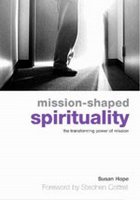
From Susan Hope 'Mission Shaped Spirituality'
"If we are to 'go' in mission, where is the energy to come from? What powers the mission? What kicki-starts it? What massive implulse can propel us from being a setteled community into being a community on the move? And what will keep us going when we find ourselves in for the long haul?"
"The spirituality of the Anglican Church is that of a settled community: it's liturgies, its way of organising itself, its buildlings, its committees... have been formed and shaped through a long time of settlement.... what will the journey of mission do to the spirituality of the Church?"
"Discovering that we are deeply loved is a lifetimes work."
"14 eldery ladies in a small church discovered that many of the children attending the school next door began the day without breakfast. They started cooking and serving breakfasts in the church hall. After a while concentration levels among children in the school improved, and so did relations between church and school. The head teacher became seriously interested and she and her husband eventually became Christians because of it."
"Fear leads to accumulation (of money)... it is impossible with integrity to proclaim Christ's salvagtion if he has evidently not saved us from greed, or his lordship if we are not good stewards of our possessions, or of his love if we close our hearts agains the needy."
(from Vincent Donovan) "Church planting... can be misleading (as a description of the missionary's task) since it implies a kind of fixed and predetermined outcome to the preaching of the gospel. The missionary's job is to preach, not the Church, but Christ. If s/he preaches Christ, the church may well result, but it might not be the church s/he had in mind."
"Christians have a right, in the name of Christ, to intrude into what has been called elsewhere 'the worlds settled arrangements'." I like this: we're so used to thinking about 'rights' in terms dictated by secular politics, what 'rights' do we have as followers of Jesus and citizens of the Kingdom? Discuss.....!
"What the Church of England could do with possibly more than anything else at present is an adventure. Settlement may have brought many blessings, but it has left us bored. And bored churches become boring churches. Western secular culture is also bored - when you've got everything, there's not a lot more to do, except to get more."
Hope makes the point that adventure grows us up faster than anything else. You can't have a learning experience if you don't have any experiences. Jesus had disciples: he taught through an apprenticeship & reflection model. It's not enough for churches to teach the same message as Jesus, we need to teach it in the same way as Jesus. How many so-called Bible-believing churches are one-eyed on this? Do we not think that Jesus was smart enough to know the best teaching methods? Yet 99% of our teaching is delivered as verbal communication. Can we develop a way of being church which looks more like Jesus way of being with the disciples?





